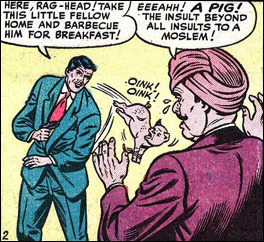| Arash Norouzi The Mossadegh Project | July 16, 2007 |
 This comic book from January 1952 [T-Man #3] has a storyline clearly ‘ripped from the headlines’ based on Iran’s oil nationalization standoff with the West. The comic-book connection is actually not so far-fetched. U.S. President Dwight D. Eisenhower described the seemingly impossible events of the 1953 coup in his memoirs as sounding “more like a dime novel than an historical fact”.
This comic book from January 1952 [T-Man #3] has a storyline clearly ‘ripped from the headlines’ based on Iran’s oil nationalization standoff with the West. The comic-book connection is actually not so far-fetched. U.S. President Dwight D. Eisenhower described the seemingly impossible events of the 1953 coup in his memoirs as sounding “more like a dime novel than an historical fact”.
This particular piece of Cold War era pulp fiction chronicles the adventures of U.S. Treasury agent Pete Trask (hence, the name ‘T-Man’), who could have just as easily been CIA agent and coup-conspirator Kermit Roosevelt, who himself has been described by New York Times reporter Stephen Kinzer as “a true-life James Bond.” Ironically, the T-Man series, like Iran’s democracy, was short-lived, both meeting their untimely end in the year 1953.


Comic Book Nation: The Transformation of Youth Culture in America
by Bradford W. Wright
John Hopkins University Press (2001)

“As the Cold War moved into developing countries, comic books championed containment in those regions as well. In a 1953 issue of John Wayne Adventure Comics, Wayne travels to the Middle East and visits a friend who runs a U.S. oil field there. Meanwhile, an Arab nationalist movement has launched a terrorist campaign to drive out American oil companies. Wayne gets involved and captures an "Arab terrorist," suspecting that this so-called Arab will "answer to Ivan and pray to Moscow." As expected, Wayne exposes the nationalist leader as a Russian agent sent to stir up trouble for American oil interests. Wayne reveals his identity to a crowd of Arabs and declares, "You see, he was making dupes of you for Moscow! What do you say--shall we produce oil for you?" The people cheer their American friends and enthusiastically pledge to buy the oil that this U.S. company will pump from their country.
Excerpt from Chicago journalist Robert Koehler’s September 2006 piece "Comic Book Patriotism":
“Most Americans haven’t the faintest idea who Mohammad Mossadegh was, which is a pity, not simply because he was a decent soul with an absolute faith in democracy, who was prime minister of Iran from 1951 until he was ousted in a covert U.S. operation in 1953, but also because . . . my God, what damnable ignorance on our part, and how it feeds the worst sort of patriotism: comic-book patriotism, I’m tempted to call it. In the latest issue, America battles the Axis of Evil.
Published from 1951 to 1956, T-Man was among the more enduring anticommunist titles and probably the only comic book ever to feature the adventures of a U.S. Treasury agent. A T-Man story published in late 1951 opens in Teheran at a meeting between British diplomats and an Iranian official, in which the participants are about to conclude a treaty granting Great Britain and the United States exclusive oil rights to Iranian oil production. The Iranian leader tells the Englishman that he is happy to give away these rights because the British and Americans have demonstrated that they respect Iranian laws and customs. Suddenly he is interrupted by someone who appears to be U.S. Treasury agent Pete Trask, who burst into the room, throws a squealing pig at the Iranian official, and says, "Here rag-head! Take this little fellow home and barbecue him for breakfast!" The agent then flees, having effectively sabotaged the treaty. Outraged by this deliberate (and extraordinarily absurd) insult to Islamic customs, the Iranian leader cancels the treaty. Later it is revealed that this ruse was the work of a Soviet agent disguised as Trask, who is trying to poison relations between Iran and the West. Inevitably, the real Pete Trask sets matters straight and ensures that the treaty is signed. In this tale, obviously inspired by the recent overthrow of the anti-Western Mossadegh government in Iran, Communism is once again contained and the United States and Great Britain win exclusive rights to Iranian oil. What Iran stands to gain from this is unclear, and, apparently unimportant.”
Note: Mossadegh was not “anti-western”. While the T-Man comic book definitely appears to be influenced by the oil nationalization controversy, the actual overthrow of Mossadegh did not occur until a year and a half after it was published, in August 1953.
Back in 1953, we were fighting Godless Communism, and there were Communists everywhere -- under our beds, in the State Department and throughout the so-called Third World, where they were particularly easy to spot because they were popular and often democratically elected, and they talked about nationalizing their nations’ resources. Such were the crimes of Jacobo Arbenz in Guatemala, Salvador Allende in Chile and, of course, Mossadegh (who threatened British Petroleum’s oil monopoly), all of whom, to great national trauma, were unseated by U.S. black ops coming to the rescue of multinational corporations about to lose their entitlements.”
Related links:
All the Sham’s Men: The CIA’s Bogus Anti-Communist Crusade in Iran
Author and Columnist Russell Baker on Media Fakery
Poet Allen Ginsberg: Iran Was Our Hostage for a Quarter Century
MOSSADEGH t-shirts — “If I sit silently, I have sinned”







